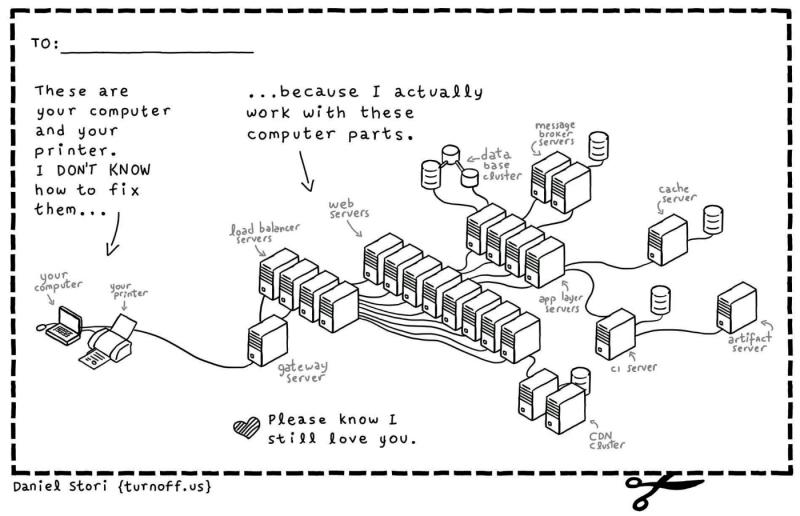Ranter
Join devRant
Do all the things like
++ or -- rants, post your own rants, comment on others' rants and build your customized dev avatar
Sign Up
Pipeless API

From the creators of devRant, Pipeless lets you power real-time personalized recommendations and activity feeds using a simple API
Learn More
Comments
-
just a thought, but.. maybe they are getting suspended? Since they are HDDs, it takes time to spin those plates back up. Listen closely if you can hear them spinning at the times they "freeze"
-
Idk, but if it would be NTFS fucking about, perhaps you could use ext2fsd or something to read ext-drives from Windows?
-
I did the same as you (though just because the drives were already formatted that way more than anything else), and pretty much had the same exact problem. NTFS sucks on Linux, it's certainly better than it *was*, but for whatever reason it's nowhere near the performance of a decent native filesystem.
Finally decided to stop being lazy, reformat the drives as XFS, and the problem went away. (You can still use Samba to mount them as windows shares, it doesn't care about the underlying file system.) -
What are you using to stream? If it's VLC, try increasing the buffer size. The stream won't require a constant read, so as mentioned drives suspend and are slow to start again. Bigger cache might offset this.
-
3 different drivers exist for NTFS
- fuse-ntfs3g (Tuxera)
- NTFS in kernel
- NTFS3 (5.15 plus)
NTFS3 might be worth a try, it's a new driver written by Paragon - if you have a recent kernel version. -
Buy a new 12T drive, format as ext4, install samba, and share.
copy all data onto it.
Then format all the old ones -
Second the lag is probably due to some bottleneck in your system
Are they spinning drives ? Sounds like
Given the sizes
Sounds like if your not number crunching your specs should be fine -
It could be a number of things
How many power on hours do the drives have ?
If you run an extended self test with smartctl what is the result ?
Have you tried switching which sata port the drives are connected to ?
Have you tried different cables ?
Have you tried increasing the kernel buffering size ? -
Starting by using ext4 could solve some unforeseen problem as I have seen issues result from doing things from ntfs
-
Hi,
My 2c
My media server has a slightly different config :
Core i5-4670K
16GB RAM
256 SSD for the system
2x1TB HDDs
First I did like you : Formatted them into NTFS. That backfired with very high CPU usage, specially for 4K playbacks.
I formatted them now as ext4.
All problems are gone. I’m using plex server on this machine and mostly LG TV plex client. Sometimes a web browser plex client for windows.
These hard drives are also exposed via samba and FTP, and I have no problems for the rare cases when I need to watch a file from windows machine and via samba share. -
So I tried changing the format of the drive... Issue persists. I tried creating a share on boot drive and streaming things out of there works perfectly
So probably my drive is dying despite reporting perfect heath. Gonna try swapping sata cables and ports. I mean, I'll buy a new drive if I have to but it's worth trying everything else first
Related Rants





 Every single time I visit my family during holidays they expect one to fix their computer/smartphone/printer/w...
Every single time I visit my family during holidays they expect one to fix their computer/smartphone/printer/w...
Hey all
Much rather ask here than on a subreddit full of jerks
I have a PC running Ubuntu 20.04LTS that I use as a media server.
8GB RAM
i3 6100
1TB Samsung HDD (Boot)
3TB Seagate Barracuda
2TB WD Blue
The 2TB and 3TB are NTFS drives. I formatted them that way because they are network shared to Windows machines. Often when watching videos off those drives, they kinda just stick for a second here and there. You know, like how a scratched DVD would.
This happens regardless of if I watching directly on the server or over the network on another PC or my TV
I tried copying a video over onto the boot drive and then it worked fine.
The 3TB has one bad sector and the 2TB is reportedly perfectly healthy. So any ideas?
Could it be as simple as bad sata or power connectors?
Speeds seem fine when copying to and from though
question
hdd
tech support